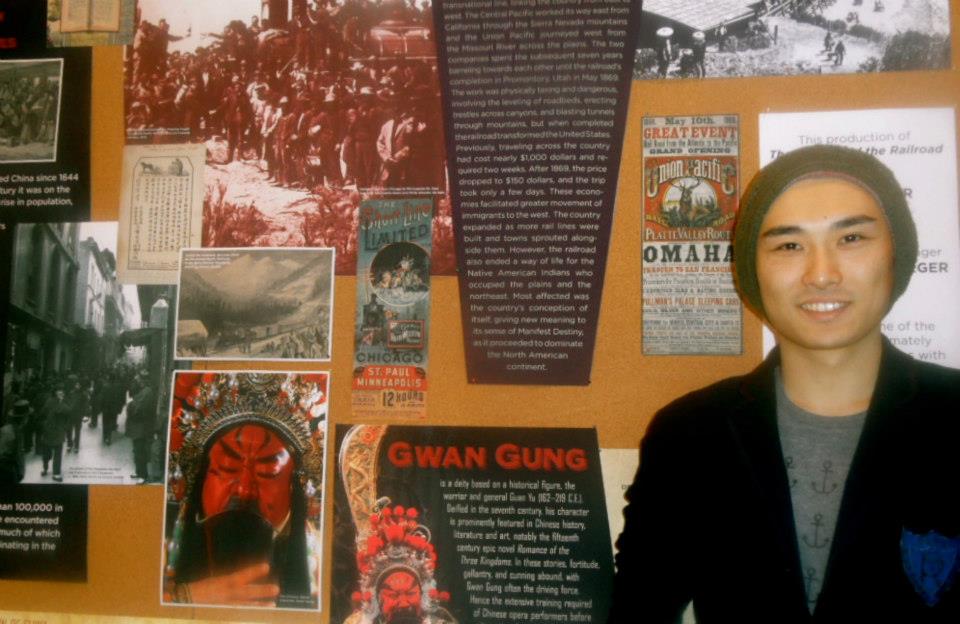A Forum in Franny’s Space
March 10, 2013

There was a sense of joy and delight in the air as Fordham theatre students and teachers welcomed back one of their own into Franny’s Space on Monday, March 4. William Wu, (FCLC ’12) and current star of the hit Off-Broadway show, “The Dance and the Railroad,” returned to his alma mater.
He and his co-star, Ruy Iskandar, sat side by side on folding chairs that were arranged in a tight circle. Dawn Saito, an artist in residence for movement and acting, moderated the conversation. The two actors shared insights on their personal stories, networking in NYC theatres, the importance of perseverance and being an Asian American artist.
DAWN SAITO: To start us off, tell us a little bit about your history.
WILLIAM WU: I was born in Northeast China, and I belong to the third generation of Beijing opera people in my family. Then I went to college for theatre and drama. It was hard because Chinese opera is very stylized. Then I came to America about nine years ago.
RUY ISKANDAR: I was born in Indonesia, moved to Singapore when I was nine, lived Australia for two years, then spent some time in Massachusetts. I was put in a high school theatre class and just fell into acting. I finished high school, went to Bard College and then I attended NYU for my MFA.
D.S.: What are some significant experiences you had working with David Henry Hwang.
W.W.: It was like a dream come true for me. I feel like David is a very gentle person, and he gives the actors a lot of space. He doesn’t give any conclusions right away, and he is very honest. You don’t even know how to deal with him sometimes, but his honesty made me feel very safe and supported.
D.S.: Where do you see connections between your training and “The Dance and the Railroad?” Where was your acting training helpful, and where did you wish you had more training?
R.I.: I’m going to tell a story. When I graduated from NYU, I was one of the people in my class who did not get any representation. I lost all pride, and I called everyone. Time was running out. I had met May, our director, at The Public Theater for a collaboration class. And she was one of the people I called, and I asked for help, and she said “Don’t worry, I got your back.” Then later, some people dropped out of a project, and she asked me to come in. And when I did, I opened the door and David Henry Hwang was sitting there.
During that tough period of transition after grad school, the agents didn’t know what to do with me. Was I a leading man? Was I a character actor? They wouldn’t take me. But now, I got my shit together. I got my equity card, and now I’m like “What can you offer me?” They are working for me now, which is how it should be! So, in a sense, that unfortunate event of not getting an agent out of grad school was probably the best thing that happened to me, that was the training for me.
W.W.: I think for training, there are different types of training. What I learned about Ruy is that he prepares. He goes for that. I know I need this. As a person, I am kind of chill, but I need to find the confidence and the hunger in myself as well. I’ve always been very lucky. I got into Fordham, got into Harvard for my MFA, met May there, auditioned, and got the part. So it was smooth sailing, but what if one day, I don’t have an agent, what will I do? Will I have the strength to call people? How do you choose your next step?
D.S.: You said something earlier that really struck me, “struggling with your identity as an Asian actor.” Could you elaborate on that?
R.I.: Well, I grew up in a predominantly white society. I was the “other.” I copied people very easily because I didn’t want to get bullied, so I began to talk like the bully. There was a point where I wanted to be white. I made up this name, this identity. When I was at Bard, I called myself “Frost” for a while. It was hard, to come to terms with myself. It wasn’t until I was in that room full of Asian artists that I came to accept myself. It took a while.
W.W.: As you can tell, I have an accent. I was not born here. I grew up in China. So I felt good about myself because I grew up in the majority. Here, I don’t like to frame or stereotype myself into anything. But trying to be an actor here, every time people will try to put you somewhere. But now, overall, I feel pretty comfortable and that is something no one can take away from me.
“The Dance and the Railroad” by David Henry Hwang will run until March 24 at the Pershing Square Signature Center at 480 W. 42nd St. Purchase your tickets now at www.signaturetheatre.org or call 212-244-7529!









